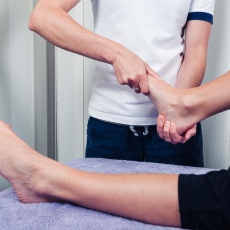
Dystonia is a movement disorder that causes involuntary contractions of your muscles. These contractions result in twisting and repetitive movements. Sometimes they are painful.
Dystonia can affect just one muscle, a group of muscles or all of your muscles. Symptoms can include tremors, voice problems or a dragging foot. Symptoms often start in childhood. They can also start in the late teens or early adulthood. Some cases worsen over time. Others are mild.
- Dystonia (National Library of Medicine)Dystonia is a movement disorder that causes involuntary contractions of your muscles. These contractions result in twisting and repetitive movements. Sometimes ...
- Dystonia 16 is one of many forms of dystonia, which is a group of conditions characterized by involuntary ... muscles, and unusual positioning of affected body parts. Dystonia 16 can appear at any age from infancy through ...
- ... PRKRA gene have been identified in people with dystonia 16. This condition is one of many forms of ... Most of the PRKRA gene mutations that cause dystonia 16 change single protein building blocks (amino acids) in ...
- ... is used to: relieve the symptoms of cervical dystonia (spasmodic torticollis; uncontrollable tightening of the neck muscles that may cause neck pain and abnormal head positions) in people 16 years of age and older; relieve the symptoms ...
- ... Blake DJ. SGCE missense mutations that cause myoclonus-dystonia syndrome impair epsilon-sarcoglycan trafficking to the plasma membrane: modulation by ubiquitination and torsinA. Hum Mol Genet. 2007 Feb 1;16(3):327-42. doi: 10.1093/hmg/ddl472. ...
- ... Blake DJ. SGCE missense mutations that cause myoclonus-dystonia syndrome impair epsilon-sarcoglycan trafficking to the plasma membrane: modulation by ubiquitination and torsinA. Hum Mol Genet. 2007 Feb 1;16(3):327-42. doi: 10.1093/hmg/ddl472. ...
- ... Bonifati V. Mutations in SLC30A10 cause parkinsonism and dystonia with hypermanganesemia, polycythemia, and chronic liver disease. Am J Hum Genet. 2012 Mar 9;90(3):467-77. doi: 10.1016/j.ajhg.2012.01.017. Epub 2012 Feb 16. Citation on PubMed or Free article on PubMed ...
- ... Bonifati V. Mutations in SLC30A10 cause parkinsonism and dystonia with hypermanganesemia, polycythemia, and chronic liver disease. Am J Hum Genet. 2012 Mar 9;90(3):467-77. doi: 10.1016/j.ajhg.2012.01.017. Epub 2012 Feb 16. Citation on PubMed or Free article on PubMed ...
- ... mental retardation with infantile epilepsy and/or hand dystonia. Am J Med Genet A. 2011 Jan;155A(1):98-105. doi: 10.1002/ajmg.a.33785. Citation on PubMed Gecz J, Cloosterman D, Partington M. ARX: a gene for all seasons. Curr Opin Genet Dev. 2006 Jun;16(3):308-16. doi: 10.1016/j.gde. ...
- ... gene have been found to cause dopa-responsive dystonia. This condition is characterized by a pattern of involuntary muscle contractions (dystonia), tremors, and other uncontrolled movements and usually responds ...



